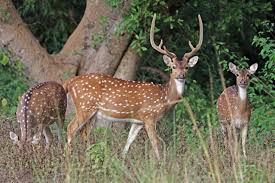
By Kathlean Wolf
Northside News
As a Wisconsin Master Naturalist volunteer, I’m focused on protecting native creatures of all kinds from the destruction that humans so often cause. So it might be a surprise that I’m also an advocate of our tradition of science-based, regulated hunting in Wisconsin.
I grew up watching “Bambi,” a Disney movie from 1942 that portrayed hunters as merciless, gun-wielding thugs. At the time “Bambi” entered theaters, deer populations had been decimated by unregulated hunting and commercial harvesting. The white-tailed deer population may have dropped as low as 20,000 by 1917. Deer were entirely absent from some states, and herds had to be rebuilt using transplants from private preserves. Some of our country’s earliest environmental legislation consisted of limited hunting seasons, then complete bans. It wasn’t until the 1980s that deer herds were fully restored to healthy, sustainable numbers nationwide.
And yet, the compelling narrative of “Bambi” still holds sway over many people of my generation; hunting is bad, hunters are thugs. It wasn’t until 2006, when I absentmindedly picked up a “Field and Stream” magazine in a waiting room, that I gained a broader view of the role hunters play in the environmental movement. On the cover, the editors celebrated a major court victory by a duck hunting club which had stopped a developer from paving over a marshland, part of a migratory bird corridor. Reading the views of the duck hunters, intelligent and caring, it dawned on me that these hunters had invested hundreds of thousands of dollars and untold hours of their time on protecting this marsh for one simple reason: they loved the land, and all its creatures.
Modern-day fishers, hunters and trappers are often the strongest advocates for environmental protection. To be a good hunter is to understand the science of sustainability and habitat protection. Without an intact habitat, the single species they pursue cannot survive and thrive. It’s in their best interest to keep waters pure, landscapes unharmed; but self-interest is not their only motivation. Hunters with whom I’ve spoken love the land every bit as much as I do, and understand it far better than many city-dwelling environmental activists I’ve known. When hunting grounds are threatened by pollution or development, it’s the hunters who often have the strongest voice in conservative circles, able to petition legislators who generally turn a deaf ear to the concerns of “liberal” environmentalists.
There is a second reason I advocate for a partnership between hunters and tree-huggers; regulated hunting maintains the balance that nature demands. Take away hunting, and Bambi and his mother both die a lingering death of starvation and illness. In the absence of predators, deer populations double within a few short years, while their food sources remain the same. Browsing for fodder beneath the snow, chewing the bark from young trees, when food gets scarce in late winter, deer can cause permanent damage to the plant life that sustains them. Only by keeping their numbers level can deer coexist as a healthy part of the landscape. When I trade my wild-foraged food for a hunter’s venison, I know that the animal died a swift death, not a lingering one, and that the rest of the herd is more likely to make it through the winter in good health.
Our legislature is currently examining the issue of one type of hunting, derby-hunts in which a great many animals are shot at once. I’m not a proponent of this type of hunting and would like to see it stopped; however, I fear the real focus of the legislation is to stir dissent between stereotypes. It is my hope that tree-hugging liberal environmentalists, hunters, and those who happen to be both, will sit down at the same table to discuss hunting regulations with an open mind, refusing to be drawn into false dichotomies. “Bambi” is a great movie, but just one part of the story; to see where we should go next, we can listen to science and to each other.